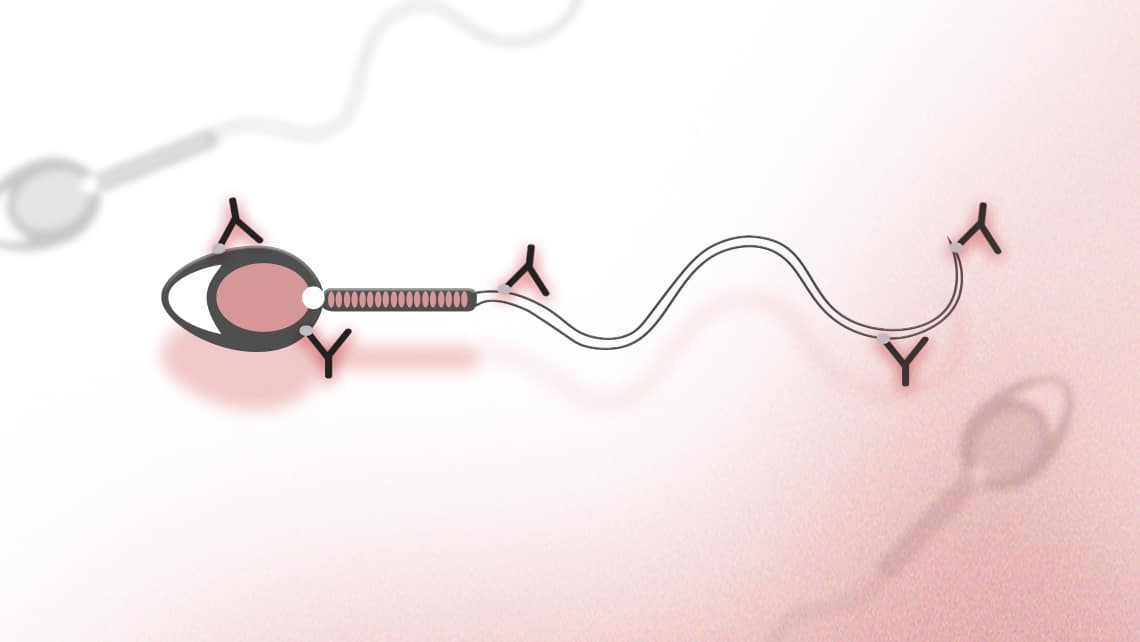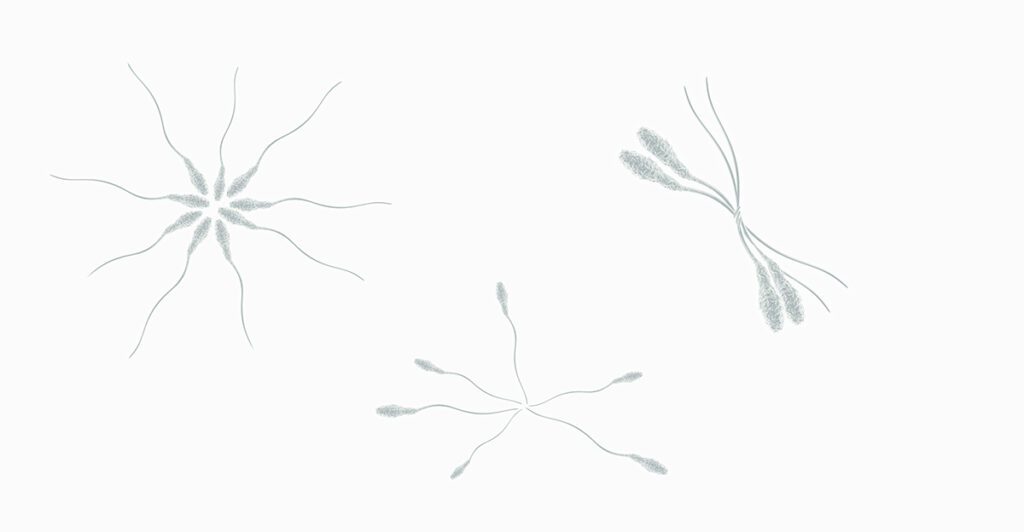
Antisperm antibodies (AAE); What is a myth and what is reality?
Now we are more than used to the word antibodies, and what they are for, which is to protect us against infections, could it be that there were antibodies capable of binding to their own cells such as sperm and preventing them from making their function?.
The answer is yes, antisperm antibodies are capable of identifying the sperm themselves as foreign and joining them, preventing them from carrying out their biological function, moving through the female reproductive tract and joining the ovum to fertilize it, giving rise to a type of infertility called Immune Infertility.
Índice
- 1 What are antisperm antibodies?
- 2 What are the causes of the appearance of anti-sperm antibodies?
- 3 Are there risk factors that facilitate the appearance of antisperm antibodies?
- 4 Can a woman develop antisperm antibodies?
- 5 How can we diagnose if there are antisperm antibodies?
- 6 What is the treatment to promote fertility if antisperm antibodies are diagnosed?
What are antisperm antibodies?
Anti-sperm antibodies are immunoglobulins. Immunoglobulins are proteins present in the blood that serve to identify and neutralise foreign agents. In humans, there are five types of immunoglobulins, which are classified into five groups depending on the area in which they are found and the antigen they are able to recognise. They are classified as IgA, IgD, IgE IgG and IgM. Ig refers to the word immunoglobulin and the letters assigned to the isotype. In particular, antisperm antibodies belong to the IgA and IgG isotypes.
What are the causes of the appearance of anti-sperm antibodies?
Spermatozoa have a high antigenic capacity, that is, they are capable of producing immunological responses as they are considered as foreign, but what factors can cause a spermatozoa to be detected as foreign?
In general, sperm are isolated by a blood-testicular barrier (Sertoli cells joined together by very tight junctions) that protects sperm production from substances circulating in the blood capillaries. When this barrier is broken, the spermatozoa are recognised as foreign agents and antibodies bind to them.
Are there risk factors that facilitate the appearance of antisperm antibodies?
The risk factors that facilitate the appearance of antisperm antibodies are those that cause the breakdown of the blood-testicular barrier by weakening the junctions between Sertoli cells. Examples of these causes can be seminal infections, trauma, testicular torsion or surgeries such as reversal after vasectomy.
Can a woman develop antisperm antibodies?

Although the relationship between the breakdown of the blood-testicular barrier and the production of antibodies has been demonstrated, not only the male can develop this type of antibody. The woman, although very rare, can produce antisperm antibodies after intercourse, it could happen in women with inflammation of the genital tract or gynaecological infection.
How can we diagnose if there are antisperm antibodies?
The presence or absence of antisperm antibodies is not quantifiable on a basic spermiogram. We can observe agglutination (formation of clusters) of sperm that can be considered normal depending on the count of the sample or the type of agglutination. The agglutinations that can suggest the existence of antisperm antibodies are those that form junction clusters of the head-head, tail-tail or head-tail type.
Although to quantitatively detect antisperm antibodies there are different tests based on the binding of labeled particles to antisperm antibodies in the ejaculate. Currently we can find the Mar-test, it detects IgA by binding to some latex balls, if the percentage of united sperm is greater than 50% the test is positive. Immunobeads, detects IgG and IgA, more complex and more specific since it allows to find out which part of the sperm the antibodies bind to, in this test marked acrylamide particles are used and a value higher than 20% is already indicative of a positive test. ELISA (Enzyme-Linked ImmunoSorbent Assay) or enzyme-linked immunosorbent assay, allows us to detect the presence of sperm in serum.
In order to detect whether it is the woman who produces the antisperm antibodies, indirect tests are used, such as the evaluation of cervical mucus after intercourse.
What is the treatment to promote fertility if antisperm antibodies are diagnosed?
There are different treatments to improve fertility in those patients who have a decrease in fertility due to the presence of antisperm antibodies.
If you want to try natural pregnancy, the treatment of choice would be Immunosuppressive Terapy. In this case, the male will be prescribed corticosteroids at high doses that will temporarily reduce (not completely eliminate) the amount of antibodies. This treatment is not satisfactory in all patients treated and can have harmful effects on health.Paragraph
If assisted reproduction techniques, Artificial Insemination or In Vitro Fertilization are to be carried out, the treatment of choice is seminal washing, during the processing of the seminal sample it will be prepared in such a way as to reduce the amount of antisperm antibodies, using the sample trained for Artificial Insemination or In Vitro Fertilization. Reproductive Medicine is currently capable of solving many of the problems that infertility can cause. In the case of antisperm antibodies, there are treatments and laboratory techniques that make it possible to solve the “bump” and continue the path towards achieving the goal of being parents. Instituto Bernabeu has a specific treatment unit for Embryo Implantation Failure.
Dr Dori Rodríguez, biologist at Instituto Bernabeu
IT MAY ALSO BE OF INTEREST TO YOU:
